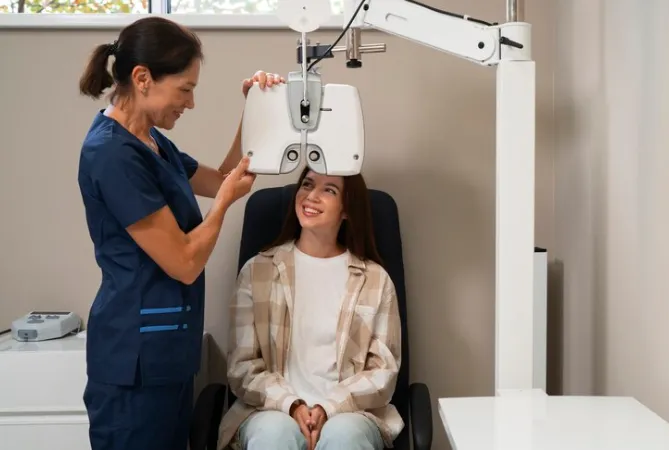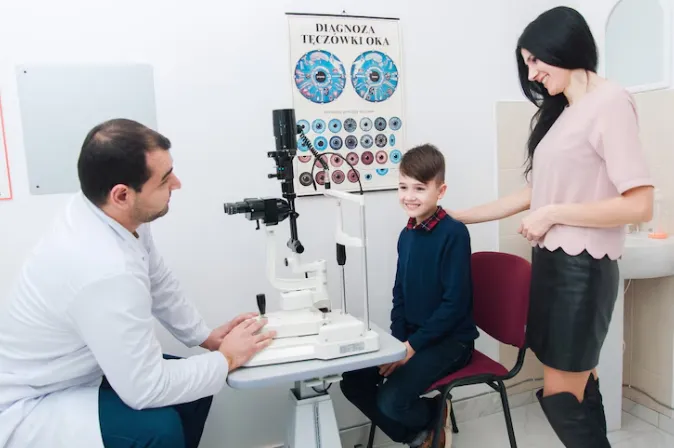Eye Care Needs in ASD
Understanding Eye Care for Autism Spectrum Disorder
FSDAVCFEBFEVSDDVFSD
FSDAVCFEBFEVSDDVFSD
FSDAVCFEBFEVSDDVFSD
Visual Processing Issues and ASD
Individuals with Autism Spectrum Disorder (ASD) often encounter unique visual processing challenges, such as difficulties with depth perception, tracking, and focusing. These issues can significantly impact learning and social interactions. Specialized eye care is crucial for addressing these needs, and routine eye exams should assess both visual acuity and how visual information is processed. For more on adapting eye exams for individuals with ASD, visit our Specialized Eye Exams page
Early diagnosis of visual processing issues enables more effective interventions. Vision therapy can improve visual skills and support overall development. Collaborating with professionals experienced in treating ASD-related visual issues ensures proper care. Learn more about the benefits of vision therapy on our Vision Therapy Services.
Individuals with Autism Spectrum Disorder (ASD) often encounter unique visual processing challenges, such as difficulties with depth perception, tracking, and focusing. These issues can significantly impact learning and social interactions. Specialized eye care is crucial for addressing these needs, and routine eye exams should assess both visual acuity and how visual information is processed. For more on adapting eye exams for individuals with ASD, visit our Specialized Eye Exams page

Early diagnosis of visual processing issues enables more effective interventions. Vision therapy can improve visual skills and support overall development. Collaborating with professionals experienced in treating ASD-related visual issues ensures proper care. Learn more about the benefits of vision therapy on our Vision Therapy Services.

Early Intervention and Vision Therapy
Early diagnosis of visual processing issues is essential for implementing effective interventions. Individuals with Autism Spectrum Disorder (ASD) who face challenges such as difficulties with depth perception, tracking, and focusing benefit significantly from timely and accurate assessments. Identifying these issues early allows for more targeted treatments and can mitigate their impact on daily life and development. Regular and specialized eye exams are crucial for assessing both visual acuity and how visual information is processed. For more information on how these exams can be adapted for individuals with ASD, visit our Specialized Eye Exams page.
Vision therapy is a key component in improving visual skills and supporting overall development in individuals with ASD. This therapeutic approach is designed to address specific visual processing issues and enhance abilities such as visual tracking, coordination, and depth perception. Working with professionals who specialize in vision therapy for ASD ensures that individuals receive tailored interventions that meet their unique needs.
To explore the benefits of vision therapy and how it can support cognitive and visual development, visit our Vision Therapy Services page. This page provides detailed information on how vision therapy can positively impact those with ASD, offering insights into the therapies available and their effectiveness.
Benefits of Specialized Eye Care

Specialized eye care offers significant benefits for individuals with Autism Spectrum Disorder (ASD). Regular eye exams are essential for tracking changes and adjusting interventions, ultimately enhancing learning experiences and daily functioning. explore our Eye Health Resources page.
Incorporating vision therapy into the care plan can greatly improve visual processing skills, leading to better academic and social outcomes. Tailored vision therapy programs are designed to meet the specific needs of individuals with ASD, helping them develop essential visual skills. For details on how vision therapy can be customized for ASD, refer to our Vision Therapy for Autism page.

Incorporating vision therapy into the care plan can greatly improve visual processing skills, leading to better academic and social outcomes. Tailored vision therapy programs are designed to meet the specific needs of individuals with ASD, helping them develop essential visual skills. This approach not only enhances visual acuity but also fosters improved interaction and learning abilities. Vision therapy can be a transformative component in an individual's development, supporting their overall well-being and daily functioning. For details on how vision therapy can be customized for ASD, refer to our Vision Therapy for Autism page.
Specialized eye care not only addresses immediate visual challenges but also supports long-term developmental progress. Consistent monitoring and customized interventions can significantly enhance an individual’s ability to process visual information and engage more effectively in various activities. By maintaining a proactive approach to eye health, individuals with ASD can achieve improved cognitive and social functioning. For ongoing support and detailed guidance on maintaining eye health, explore our Eye Health Resources page.
Benefits of Early Intervention
Early intervention is crucial for individuals with Autism Spectrum Disorder (ASD) to address visual processing issues effectively. By starting vision therapy at a young age, individuals can develop necessary visual skills that support their learning and social interactions. Early diagnosis allows for tailored treatment plans that can significantly enhance developmental outcomes and reduce challenges in daily activities. Additionally, proactive management of visual processing issues can lead to more successful integration into educational and social settings, providing a stronger foundation for future growth.
Additionally, proactive vision care can prevent further complications and improve overall quality of life. Regular check-ups and targeted therapies help in adjusting strategies as needed and ensuring optimal progress. For more information on the benefits of early intervention and how it can positively impact individuals with ASD, visit our Vision Therapy for Autism page.
Managing Vision Challenges with ASD
Managing vision challenges in individuals with ASD requires a multidisciplinary approach. Collaboration between eye care professionals, educators, and therapists ensures all aspects of the individual's needs are addressed. Personalized care plans that include regular eye exams, vision therapy, and supportive interventions can enhance treatment effectiveness. Our Autism Spectrum Disorder Services offers additional information on how a coordinated approach can benefit individuals with ASD.
Tailoring eye care to the unique needs of individuals with ASD is crucial for improving their quality of life. By staying proactive and informed about visual processing issues, families and caregivers can better support those with ASD. For guidance on navigating eye care for autism, Contact us today.
Managing vision challenges in individuals with ASD requires a multidisciplinary approach. Collaboration between eye care professionals, educators, and therapists ensures all aspects of the individual's needs are addressed. Personalized care plans that include regular eye exams, vision therapy, and supportive interventions can enhance treatment effectiveness. Our Autism Spectrum Disorder Services offers additional information on how a coordinated approach can benefit individuals with ASD.

Tailoring eye care to the unique needs of individuals with ASD is crucial for improving their quality of life. By staying proactive and informed about visual processing issues, families and caregivers can better support those with ASD. For guidance on navigating eye care for autism, Contact us today.

Strategies for Effective Vision Care in ASD
Tailoring eye care to the unique needs of individuals with Autism Spectrum Disorder (ASD) is crucial for improving their quality of life. Specialized eye care helps address visual processing issues that can impact daily functioning and overall development. Regular eye exams, adapted to assess specific visual challenges associated with ASD, play a vital role in identifying issues early and implementing appropriate interventions. These exams are designed not only to check visual acuity but also to evaluate how visual information is processed and utilized.
A comprehensive approach includes collaboration between eye care professionals, educators, and caregivers. Working together ensures that the vision care plan aligns with educational goals and therapeutic needs. Vision therapy can be particularly effective, as it targets specific visual skills and challenges unique to individuals with ASD. Customized therapy programs can help improve visual tracking, depth perception, and focusing abilities, which are essential for academic success and social interactions.
Incorporating practical strategies into daily routines also supports better visual processing. Techniques such as using visual aids, adjusting lighting, and providing clear visual instructions can make a significant difference. Families and caregivers can benefit from learning these strategies to help manage visual processing challenges at home and in educational settings.
For further guidance on navigating eye care for autism and to explore strategies for effective vision management, visit us today. This resource offers valuable insights and practical advice for supporting individuals with ASD in achieving better visual and cognitive outcomes.
Routine Eye Exams for ASD
Routine eye exams are essential for individuals with Autism Spectrum Disorder (ASD) to monitor and manage their visual health effectively. These exams are crucial for detecting any changes in vision and ensuring that appropriate interventions are implemented. Regular check-ups with eye care professionals who are experienced in handling ASD-related visual issues can significantly enhance eye health and overall well-being.

Routine eye exams are essential for individuals with Autism Spectrum Disorder (ASD) to monitor and manage their visual health effectively. These exams are crucial for detecting any changes in vision and ensuring that appropriate interventions are implemented. Regular check-ups with eye care professionals who are experienced in handling ASD-related visual issues can significantly enhance eye health and overall well-being.
Consistent evaluations help in addressing visual processing challenges early and making necessary adjustments to care plans. Regular eye exams can lead to timely interventions and better management of visual issues. For more information on why routine eye exams are important and how they contribute to managing visual health, visit our Routine Eye Exams page.
Consistent evaluations help in addressing visual processing challenges early and making necessary adjustments to care plans. Regular eye exams can lead to timely interventions and better management of visual issues. For more information on why routine eye exams are important and how they contribute to managing visual health, visit our Routine Eye Exams page.
Supporting Visual Development in ASD
Supporting visual development in individuals with Autism Spectrum Disorder (ASD) involves addressing specific visual processing challenges and integrating targeted therapeutic strategies. These interventions are essential for improving visual skills, which can significantly enhance cognitive and developmental outcomes. By focusing on the unique needs of individuals with ASD, caregivers and professionals can create effective care plans that address these challenges.
Effective visual support not only helps with daily functioning but also promotes overall developmental progress. For comprehensive details on how targeted interventions can aid in visual development, visit our Visual Development Support page. This resource offers valuable insights into strategies and therapies designed to support and improve visual skills for individuals with ASD, ensuring they receive the best possible care.

Contact Info
Hours of Operation
Mon - Fri | 9:00 AM - 5:00 PM
Sat - Sun | Closed
Holiday Hours: We are closed for the following holidays: New Years Day, Memorial Day, Independence Day, Labor Day, Thanksgiving Day, Christmas Day
© 2026 Kleinwood Vision. All rights Reserved.


